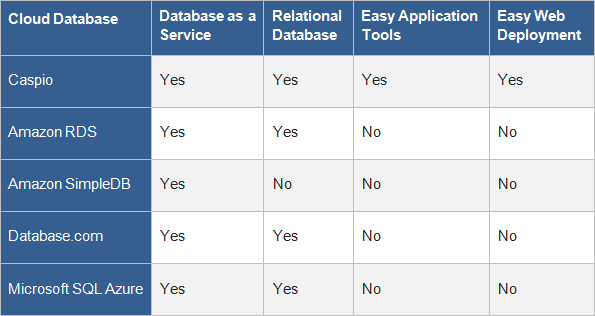Comparing Cloud Database Services
December 15, 2011

Online database technology is in high demand. Why? It easily allows companies storage and access to data without requiring specific knowledge about the physical system that delivers the service. Data can be accessed from anywhere and the amount of storage can scale on demand. Cloud databases are attractive for small or large businesses because new applications can be deployed with little to no upfront investment or long-term commitment.
As with most services, the pricing and quality can vary greatly from one cloud database solution to another. Caspio’s database platform is the leading cloud solution for creating custom business apps for numerous reasons. Its ease-of-use, pricing, and technical quality distinguish it from other cloud database solutions such as Amazon’s Relational Database Service and Salesforce’s Database.com.
Caspio Compared to Other Popular Cloud Databases

Caspio provides easy web application development and deployment. The all-in-one platform helps non-programmers create applications and allows professional developers to create them faster. Unlike other services, Caspio lets you deploy your applications to as many people as your website can attract, with no per-user fees.
Amazon RDS and SimpleDB
In contrast, Amazon RDS is a cloud deployment option for MySQL, an open source relational database management system. It caters to users seeking a cloud-hosted version of MySQL, and it provides no integrated application building tools. Amazon’s SimpleDB is a tool for organizing flat database records. Amazon offers Infrastructure-as-a-Service architecture – a catalog of discrete services that developers can piece together to create applications. Simply put, Amazon caters to developers.
Salesforce Database.com
Salesforce’s Database.com offers a set of application programming interfaces (APIs) for invoking data storage and retrieval functions from the database clusters in the company’s data centers. It’s a service for coders to leverage the Salesforce platform and its proprietary developer tools and programming languages. Often, developers use Database.com and Force.com for extending Salesforce.com applications.
Microsoft SQL Azure
Microsoft offers a cloud-based version of its operating system and middleware products called Windows Azure. One element of which is SQL Azure – a version of Microsoft SQL Server hosted in the cloud. This is a Database-as-a-Service for enterprise application developers and independent software vendors who want to build on their experience with Microsoft technologies.
Caspio’s Approach to Cloud Database
Caspio uses Microsoft SQL Server technology, but with a key difference. The enterprise database is used behind-the-scenes as a standard and proven relational database engine, while Caspio users work in an environment similar to Microsoft Access. Professional developers can extend Caspio applications through APIs based on web services standards (this can be useful for integrating or synchronizing Caspio applications with other software). The functionality and design of Caspio applications can be improved with HTML, JavaScript, and Cascading Style Sheets. Caspio’s most powerful advantage is its wizard-based tools for designing databases, forms, and reports without programming – they really help to improve productivity.
Caspio is a Platform-as-a-Service that relates more closely to the Software-as-a-Service end of the cloud database spectrum. It empowers business users with easy-to-use web-based software that is as powerful as enterprise systems. Its specialized approach puts the development tools in the hands of the end user, compared to other services designed solely for IT professionals. Ultimately, Caspio aims to make new cloud applications as easy as possible to create, and is backed by our extensive customer support, training, and professional services.
This is what “cloud database” means to us. Let us know what it means to you by leaving a comment below.
Feel free to sign up for a 14-day trial account and explore what you can do with Caspio’s powerful cloud database.















